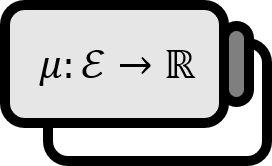Proof of Levy's Theorem in Measure Theory
Theorem 1
If $\displaystyle \sum_{k=1}^{\infty} \int |f_{k}| dm < \infty$, then $\displaystyle \sum_{k=1}^{\infty} f_{k} (x)$ converges almost everywhere and is Lebesgue integrable with the integration explicitly as follows. $$ \int \sum_{k=1}^{\infty} f_{k} dm = \sum_{k=1}^{\infty} \int f_{k} dm $$
Proof
Part 1. That $\displaystyle \sum_{k=1}^{\infty} f_{k} (x)$ converges almost everywhere and is Lebesgue integrable
If we define $\displaystyle \phi (x) := \sum_{k=1}^{\infty} | f_{k} (x) |$, then $\phi$ is a non-negative measurable function.
The corollary of the Monotone Convergence Theorem: Let’s say the sequence of non-negative measurable functions $\left\{ f_{n} \right\}$ satisfies $f_{n} \nearrow f$. Then $$\int \sum_{n=1}^{\infty} f_{n} dm = \sum_{n=1}^{\infty} \int f_{n} dm$$
By the Monotone Convergence Theorem, $$ \displaystyle \int \phi dm = \sum_{n=1}^{\infty} \int | f_{k} | dm $$ and since it was assumed that $\displaystyle \sum_{k=1}^{\infty} \int |f_{k}| dm < \infty$, $\int \phi dm$ takes a finite value, hence $\phi$ is Lebesgue integrable, that is $\phi \in \mathcal{L}^{1}$. Therefore, $\phi$ is finite almost everywhere, and from its definition, $$ \sum_{k=1}^{\infty} \left| f_{k} \right| = \phi < \infty $$ thus $\displaystyle \sum_{k=1}^{\infty} | f_{k } (x) |$ converges almost everywhere, and $\displaystyle \sum_{k=1}^{\infty} f_{k } (x)$ also converges almost everywhere. Meanwhile, $$ \begin{align*} \left| \sum_{ k=1 }^{ n } f_{k} (x) \right| \le & \sum_{ k=1 }^{ n } \left| f_{k} (x) \right| \\ \le & \sum_{k=1}^{\infty} \left| f_{k} (x) \right| \\ = & \phi (x) \end{align*} $$ thus, for all $n \in \mathbb{N}$, the inequality $\displaystyle \left| \sum_{ k=1 }^{ n } f_{k} (x) \right| \le \phi (x)$ almost everywhere holds. Lastly, $\phi$, though similar but without absolute values within the sigma, $f$ is defined $$ f(x) := \sum_{k=1}^{\infty} f_{k} (x) $$ as such, and those points where $f$ does not converge are simply left as $f(x)$ to ensure it is a Lebesgue integrable function. This prepares us for the use of the Dominated Convergence Theorem. $$ \left| \sum_{ k=1 }^{ n } f_{k} \right| \le \phi \qquad , \phi \in \mathcal{L}^{1} \\ f = \lim_{n \to \infty} \sum_{k=1}^{n} f_{k} $$
Part 2. The specific integration
The Dominated Convergence Theorem: Let’s say for a measurable set $E \in \mathcal{M}$ and $g \in \mathcal{L}^{1} (E)$, the sequence of measurable functions $\left\{ f_{n} \right\}$ satisfies $E$ almost everywhere in $|f_{n}| \le g$. If almost everywhere in $E$ is $\displaystyle f = \lim_{n \to \infty} f_{n}$, then $$f \in \mathcal{L}^{1}(E) \\ \lim_{ n \to \infty} \int_{E} f_{n} (x) dm = \int_{E} f dm$$
Hence the following holds. $$ \begin{align*} \int \sum_{k=1}^{\infty} f_{k} dm = & \int \lim_{n \to \infty} \sum_{k=1}^{n} f_{k} dm \\ =& \int f dm \\ =& \lim_{n \to \infty} \int \sum_{k=1}^{n} f_{k} dm \\ =& \lim_{n \to \infty} \sum_{k=1}^{n} \int f_{k} dm \\ =& \sum_{k=1}^{\infty} \int f_{k} dm \end{align*} $$
■
Explanation
This theorem, proved by the Italian mathematician Beppo Levi, amazingly simplifies the integration of function sequences.
Example
Find $\displaystyle \int_{0}^{1} \left( {{ \log x } \over {1-x}} \right)^2 dx$.
Solution
If we define $f_{n} (x) : = n x^{n-1} ( \log x )^2$, since $\displaystyle \sum_{n=1}^{\infty} n x^{n-1} = {{1} \over {(1-x)^2}}$, thus $$ \sum_{n=1}^{\infty} f_{n} (x) = \left( {{ \log x } \over {1-x}} \right)^2 $$ By Levi’s theorem, $$\int_{0}^{1} f (x) dx = \sum_{n=1}^{\infty} \int_{0}^{1} f_{n} (x) dx$$ but by the method of integration by parts, $$\int_{0}^{1} f_{n} (x) dx = \int_{0}^{1} n x^{n-1} ( \log x )^2 dx = {{2} \over {n^2}}$$ Thus, we obtain the following. $$\displaystyle \int_{0}^{1} f(x) dx = \sum_{n=1}^{\infty} {{2} \over {n^2}} = {{\pi^2} \over {3}}$$
Commentary
The essence of solving the problem eventually lies in finding $f_{n}$ that satisfies $ \begin{cases} \displaystyle \sum_{n=1}^{\infty} f_{n} (x) = f(x) \\ \displaystyle \int_{E} f(x) dx = \sum_{n=1}^{\infty} \int_{E} f_{n} (x) dx \end{cases}$. Although this process is genuinely challenging, it would be considerably easier than solving through finding an antiderivative like in Riemann integration.
See Also
Capinski. (1999). Measure, Integral and Probability: p95. ↩︎
